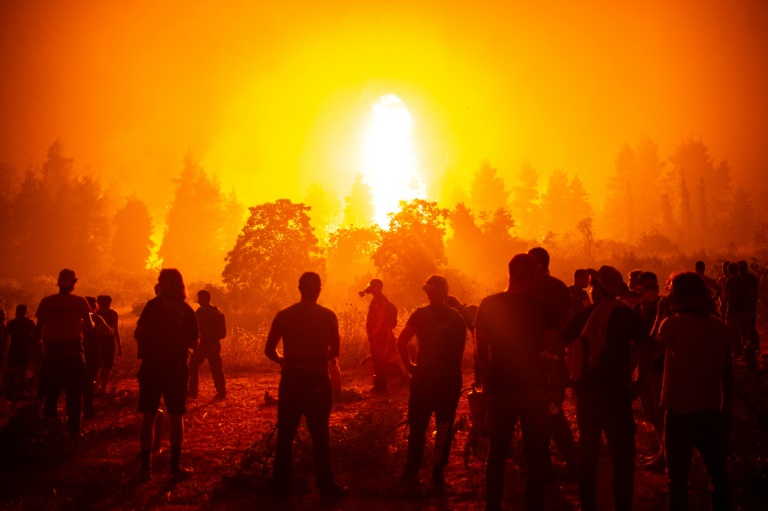Firefighters on the Greek island of Evia dug in late Monday in a desperate battle to prevent wildfires, which have been burning for a week, from reaching a regional hub with thousands of residents.
In eerie images broadcast by Greek state TV ERT, firemen and volunteers formed a line opposite a row of huge trees a few kilometres from the town of Istiaia, determined not to let the fire pass.
A short distance away, a massive wall of flame crept closer.
The civil protection authority had earlier ordered the evacuation of the nearby village of Avgaria, but as a local official admitted, many residents are determined to stay and defend their homes.
“Villages are evacuated, but those who can help stay behind,” central Greece governor Fanis Spanos told state agency ANA.
“Without them, many villages would have burned,” Spanos said.
Hundreds of homes have already been lost in Evia, greater Athens and other parts of Greece in wildfires that have been raging almost without pause since late July.
Thousands have fled their homes to escape the fires.
— PM apologises —
On Monday, facing criticism from the opposition for aerial fire-fighting support deemed inadequate, Prime Minister Kyriakos Mitsotakis apologised to the nation and vowed to punish those responsible.
“I apologise for any shortcomings” in the state response, Mitsotakis said in a televised address.
“We may have done what was humanly possible, but in many cases it was not enough,” he said.
Some 650 firefighters have so far been deployed on Evia, according to Greek authorities.
Greek officials have already blamed climate change for the extreme heat, and the UN released a major report on Monday showing how the threat from warming is even more acute than previously thought.
Two people died near Athens last week — a volunteer firefighter hit by a power pylon, and an industrialist who suffered a heart attack as the fire approached his factory.
A third man whose bulldozer fell into a cliff during a weekend fire in central Greece died Monday.
Several others have been hospitalised with smoke inhalation, burns and other injuries.
— ‘Desperately alone’ —
Many mayors around the country have complained of a serious lack of aerial support in fighting the fires, despite the government’s assurances of having set aside ample resources earlier this year.
“Local officials and citizens cry out that they are desperately alone… for how long will this drama endure?” main opposition leader Alexis Tsipras tweeted on Sunday.
In response, Mitsotakis said over 580 fires had broken out in recent days around the country, exposing Greece to a “natural fury without precedent”.
“Because of the unprecedented heatwave and prolonged drought, (the fires) are hard to extinguish,” he said.
Civil protection deputy minister Nikos Hardalias has said that water bombers have faced “serious difficulties” including turbulence, thick smoke and limited visibility.
The defence ministry on Monday denied reports that the head of the army’s air support had resigned in response to the criticism.
In addition to being criticised for alleged poor preparation and resource mismanagement, government officials are also accused of avoiding the media at the height of the disaster.
After the Athens union of journalists lodged a formal complaint, the PM and Hardalias announced press conferences this week.
From July 29 to August 7, 56,655 hectares (140,000 acres) were burnt in Greece, according to the European Forest Fire Information System.
The average area burnt over the same period between 2008 and 2020 was 1,700 hectares.
– Europe’s biggest firefighting operation’ –
The civil protection authority on Monday said EU states and other countries had so far contributed 21 aircraft, 250 vehicles and over 1,200 firefighters, some of whom were expected between Tuesday and Friday.
Mitsotakis said on Monday he discussed with his Russian counterpart Mikhail Mishustin the delivery of an additional giant BE-200 water bomber.
He later spoke to Israeli PM Naftali Bennett, who pledged an additional two fire bombers.
Neighbour and traditional rival Turkey also pledged two fire-fighting aircraft, the Greek foreign ministry said.
The UN’s Intergovernmental Panel on Climate Change laid bare the challenges facing the planet with a major report on Monday.
The IPCC said global temperatures would probably hit the level of 1.5 degrees Celsius above pre-industrial levels by around 2030 — a decade earlier than it projected just three years ago.
The EU said it was mobilising “one of Europe’s biggest ever common firefighting operations” to assist Greece and other countries.
The response was needed “as multiple fires affect several countries simultaneously”, EU crisis management commissioner Janez Lenarcic said.
The situation looked better elsewhere, with officials saying that fires in the southwestern Peloponnese region and in a suburb north of Athens had abated. A fire on Crete was also brought under control.









